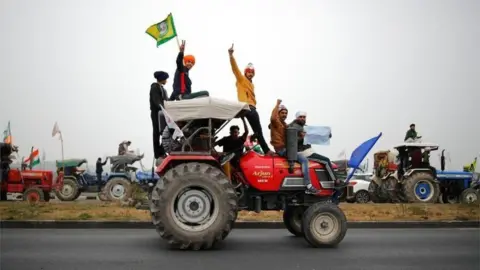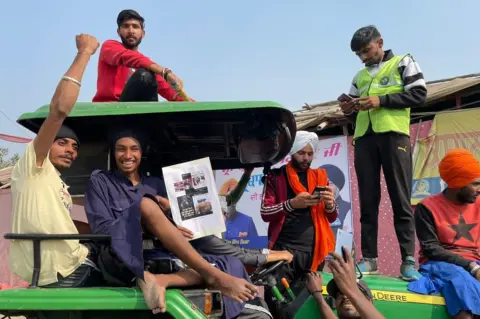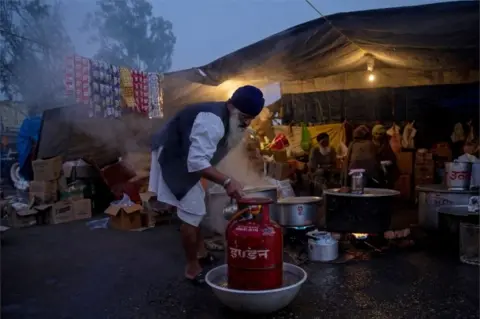Farm laws: India PM Narendra Modi repeals controversial reforms
农业法:印度总理纳伦德拉·莫迪否决有争议的改革
农民庆祝废除有争议的法律
Indian PM Narendra Modi has announced the repeal of three controversial farm laws after a year of protests.
经过一年的抗议后,印度总理纳伦德拉·莫迪宣布废除三项有争议的农业法。
Thousands of farmers had camped at Delhi's borders since last November and dozens died from heat, cold and Covid.
自去年11月以来,数千名农民在德里边境露营,数十人死于炎热、寒冷和新冠肺炎。
Farmers say the laws will allow the entry of private players in farming and that will hurt their income.
农民们表示,这些法律将允许私人参与者进入农业领域,但这将损害他们的收入。
Friday's surprise announcement marks a major U-turn as the government had not taken any initiative to talk to farmers in recent months.
周五的意外宣布标志着一个重大转变,因为近几个月来政府没有采取任何主动与农民对话的行动。
And Mr Modi's ministers have been steadfastly insisting that the laws were good for farmers and there was no question of taking them back.
莫迪的部长们一直坚定地坚称,这些法律对农民有利,而且不存在收回这些法律的问题。
Farm unions are seeing this as a huge victory. But experts say the upcoming state elections in Punjab and Uttar Pradesh - both have a huge base of farmers - may have forced the decision.
农场工会认为这是一次巨大的胜利。但专家表示,旁遮普邦和北方邦即将举行的州选举——这两个邦都有庞大的农民基础——可能迫使他们做出这一决定。
The announcement on Friday morning came on a day Sikhs - the dominant community in Punjab - are celebrating the birth anniversary of Guru Nanak, the founder of Sikhism.
周五早上宣布这一消息的当天,旁遮普邦的主要社区锡克教徒正在庆祝锡克教创始人古鲁纳纳克的诞辰纪念日。
In his nationally-televised address, Mr Modi said the farm laws were meant to strengthen the small farmers. "But despite several attempts to explain the benefits to the farmers, we have failed. On the occasion of Guru Purab, the government has decided to repeal the three farm laws," he added.
莫迪在全国电视讲话中表示,农业法旨在增强小农的实力。 “但是,尽管我们多次尝试向农民解释这些好处,但我们还是失败了。在普拉布大师之际,政府决定废除三项农业法,”他补充道。
What did the laws offer?
法律提供了什么?
Taken together, they loosened rules around sale, pricing and storage of farm produce - rules that have protected India's farmers from the free market for decades.
总而言之,他们放宽了有关农产品销售、定价和储存的规则——几十年来这些规则一直保护印度农民免受自由市场的影响。
One of the biggest changes was that farmers were allowed to sell their produce at a market price directly to private players - agricultural businesses, supermarket chains and online grocers. Most Indian farmers currently sell the majority of their produce at government-controlled wholesale markets or mandis at assured floor prices (also known as minimum support price or MSP).
最大的变化之一是农民可以以市场价格直接向私人参与者(农业企业、连锁超市和在线杂货商)出售农产品。目前,大多数印度农民在政府控制的批发市场或曼迪斯以保证底价(也称为最低支持价格或 MSP)出售大部分农产品。
 Reuters 路透社
Reuters 路透社农民们在连接德里和其他邦的高速公路上抗议
The laws allowed private buyers to hoard food like rice, wheat and pulses for future sales, which only government-authorised agents could do earlier.
这些法律允许私人买家囤积大米、小麦和豆类等食品以供将来销售,而只有政府授权的代理商才能更早地这样做。
The reforms, at least on paper, gave farmers the option of selling outside of this so-called "mandi system". But the protesters said the laws would weaken the farmers and allow private players to dictate prices and control their fate. They said the MSP was keeping many farmers going and without it, many of them will struggle to survive.
这些改革,至少在纸面上,让农民可以选择在所谓的“曼迪系统”之外进行销售。但抗议者表示,这些法律将削弱农民的力量,并允许私人参与者决定价格并控制他们的命运。他们表示,MSP 使许多农民得以生存,如果没有它,他们中的许多人将难以生存。
They said India's stringent laws around the sale of agricultural produce and high subsidies had protected farmers from market forces for decades and there was no need to change that.
他们表示,印度有关农产品销售和高额补贴的严格法律几十年来一直保护农民免受市场力量的影响,没有必要改变这一点。
But the government argued that it was time to make farming profitable for even small farmers and the new laws were going to achieve that.
但政府认为,现在是让农业盈利的时候了,即使是小农,新法律也将实现这一目标。
What has the reaction been?
反应如何?
Farmers in Punjab and Haryana are celebrating the news, raising flags of victory and distributing sweets. But they say the fight is not over.
旁遮普邦和哈里亚纳邦的农民正在庆祝这一消息,举起胜利旗帜并分发糖果。但他们说战斗还没有结束。
"We have no faith in a verbal promise. Unless we see it in writing that the laws have actually been repealed, we will stay here," Raj Singh Chaudhary, a 99-year-old protester, told the BBC's Salman Ravi.
“我们对口头承诺没有信心。除非我们以书面形式看到法律实际上已被废除,否则我们将留在这里,”99 岁的抗议者拉杰·辛格·乔杜里 (Raj Singh Chaudhary) 告诉 BBC 的萨尔曼·拉维 (Salman Ravi)。

农民在德里和辛胡边境庆祝
Mr Chaudhary is among hundreds of farmers who have been striking at the Delhi-Ghazipur border for a year.
乔杜里是数百名农民中的一员,他们在德里-加齐布尔边境举行了一年的罢工。
His view was echoed by Rakesh Tikait, a prominent farmer leader who said they would call off the protest only after the laws were repealed in the winter session of parliament.
著名农民领袖拉克什·蒂凯特(Rakesh Tikait)也赞同他的观点,他表示,只有在议会冬季会议废除这些法律后,他们才会取消抗议活动。
Another farmer leader said they needed additional promises from the government around assured prices for their crops to end their protest.
另一位农民领袖表示,他们需要政府就农作物的保证价格做出更多承诺,以结束抗议。
The announcement has stunned political observers as well as those who both support and oppose the laws - many tweeted saying it was a huge victory for the farmers and a "major climbdown" for Mr Modi.
这一宣布震惊了政治观察家以及那些支持和反对这项法律的人——许多人在推特上表示,这是农民的巨大胜利,也是莫迪先生的“重大让步”。
But some farm leaders and economists who saw merit in the laws have expressed disappointment over their repeal. Anil Ghanwat, head of a farmers' union in western India, said it was an "unfortunate" decision driven by political considerations.
但一些看到该法律优点的农场领导人和经济学家对废除该法律表示失望。印度西部农民联盟主席阿尼尔·甘瓦特表示,这是出于政治考虑而做出的“不幸”决定。
Opposition parties welcomed the decision, with Congress party leader Rahul Gandhi calling it "a win against injustice". And West Bengal Chief Minister Mamata Banerjee, took to social media to praise farmers and congratulate them.
反对党对这一决定表示欢迎,国大党领袖拉胡尔·甘地称其为“对抗不公正的胜利”。西孟加拉邦首席部长玛玛塔·巴纳吉在社交媒体上赞扬农民并向他们表示祝贺。
BJP members said the decision to repeal the laws had nothing to do with the polls and the decision was taken to end the protest. They did not say if there were plans to bring back the laws in another form later.


Narendra Modi's decision to repeal the contentious farm laws is, at once, a strategic and political move and a belated admission of the government's haste and high-handedness.
The laws had whipped up an unprecedented firestorm of protests in the states of Punjab and Uttar Pradesh and posed a real challenge to Mr Modi. They had mobilised farmers and civil society in Sikh-majority Punjab and spread to parts of Uttar Pradesh, states which will see key elections early next year.
By repealing the laws, Mr Modi hopes to regain the confidence of the farmers in general and Sikhs in particular. It would also boost the BJP's chances in the polls.
Click here to read the full analysis.

What led to the repeal?
The Samyukta Kisan Morcha (SKM), an umbrella group of some 40 farmers' unions, had refused to back down despite appeals from the government to end their protest.
Farmers continued to block motorways to Delhi through harsh winter and summer months and even through deadly Covid waves. They called for strikes across the country and dozens of them even died due to cold, heat and Covid.
The government initially engaged with them and offered to put the laws in abeyance for two years. But after farmers rejected their overtures, the authorities retreated, preferring to go with the wait-and-watch attitude.
 Reuters
ReutersBut two things changed in the last few months.
First, the son of a federal minister allegedly drove his car into a group of protesting farmers in Lakhimpur in Uttar Pradesh in early October. He denied the allegation, but was arrested. Eight people, including four farmers and a journalist, were killed in the incident which sparked outrage across the country and put the government on the back foot.
Second, PM Modi's Bharatiya Janata Party (BJP) is up against strong regional parties in the upcoming elections in Punjab, Uttar Pradesh and Uttarakhand and the government knows that angry farmers would hurt the BJP's chances of winning the crucial polls.


